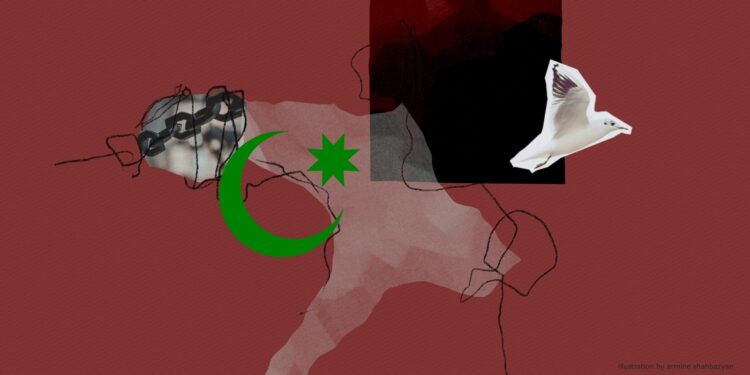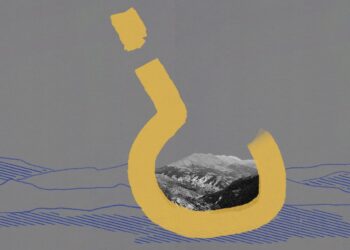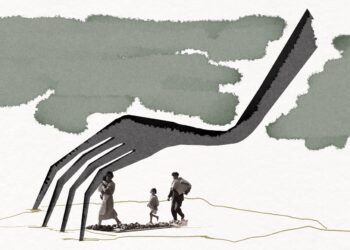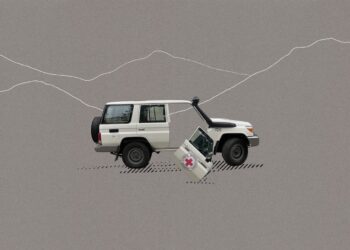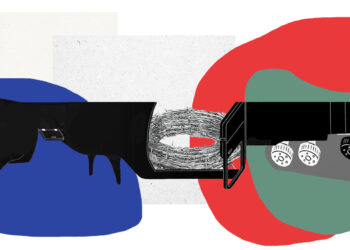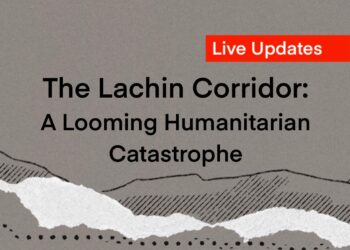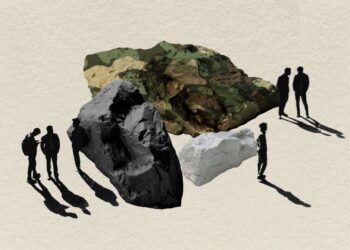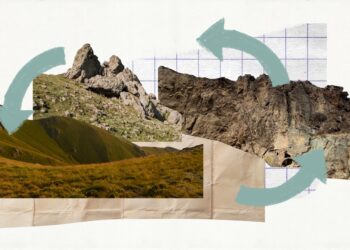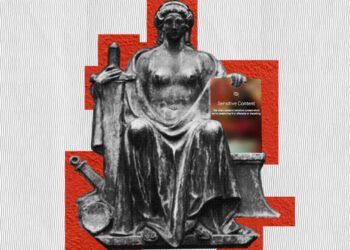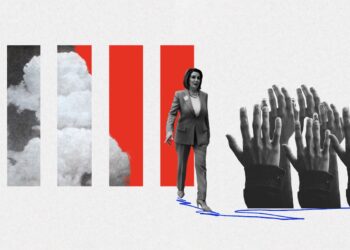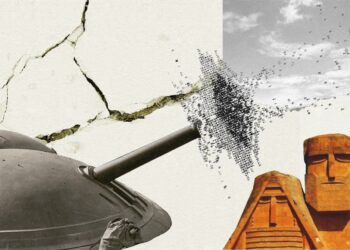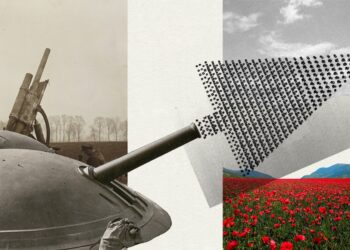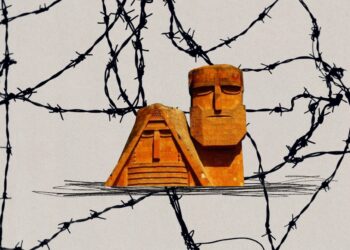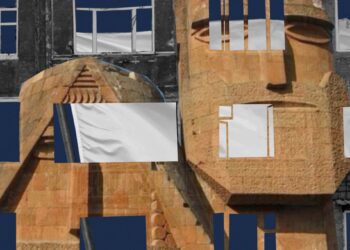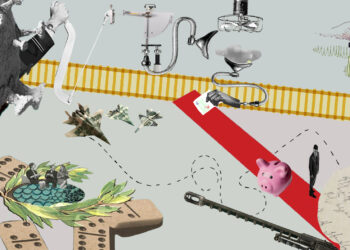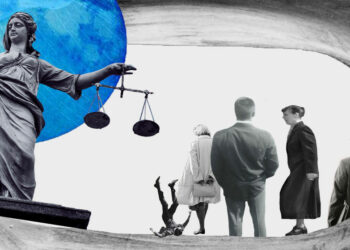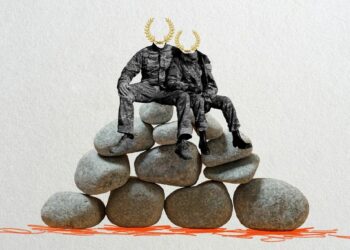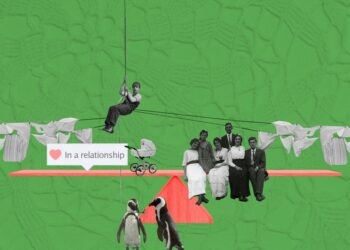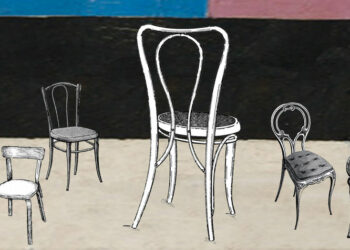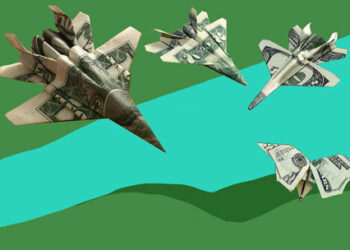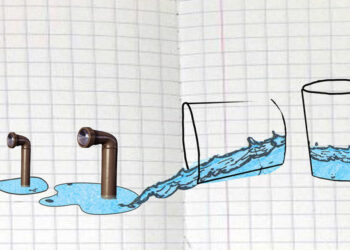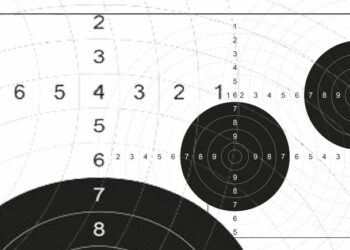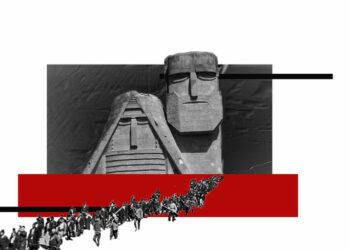Politics
Untangling Armenia’s Indian Arms Procurement
As the procurement of Indian weapons by Armenia has come under the spotlight, various Indian outlets, ranging from credible publications to blogs, have extensively and often speculatively covered Armenia’s arms acquisitions, underscoring the need to clarify the details. Hovhannes Nazaretyan’s investigation.
Amid Security Concerns, New Poll Indicates Positive Direction With Continued Russian Retreat
The latest survey by the International Republican Institute, conducted in December 2023, reveals the consolidation of public distrust in Russia, strong support for the Government’s pivot toward the West, and a growing sophistication in the Armenian public’s understanding of its complex security concerns.
Armenia’s Railways: Hindered by Geopolitics and Economic Realities
Landlocked Armenia, surrounded on two sides by unrelenting foes, has limited access to the outside world. Railways could potentially help alleviate this isolation by providing reliable outside connections for trade and passenger traffic.
How Azerbaijan Deceives and Harasses the International Community
Azerbaijan has been using military and diplomatic coercion to achieve its maximalist and expansionist objectives, employing wide-ranging tools of hybrid war while also deceiving and harassing international actors. Sossi Tatikyan explains.
Enclaves Enter Armenia-Azerbaijan Peace Talks
The issue of tiny but strategically placed Soviet-era enclaves in Armenia and Azerbaijan has come to the forefront of peace talks in recent months. Hovhannes Nazaretyan maps it out.
EU, U.S. Elections Could Test Armenia’s Resilience
As the geopolitical landscape in the South Caucasus remains precarious, potential changes in EU and U.S. leadership can pose additional challenges for Armenia. Amid these uncertainties, Armenia's diplomatic efforts become increasingly important and serve as a test of its resilience.
Hypocrisy and Mystification: Azerbaijan in the Non-Aligned Movement
The Non-Aligned Movement is a diplomatic platform where Azerbaijan, as a major oil-producing nation, tries to exert influence by supporting ex-colonies that are purportedly fighting colonialism. Garren Jansezian explains.
Aliyev Appears Open to Peace, Yet Prepares for Another Conflict
President Ilham Aliyev consistently delivered speeches full of hateful rhetoric directed at the Armenian people as the blockade of Artsakh was ongoing and even after the ethnic cleansing of the Armenians. Tatevik Hayrapetyan provides a compilation of some of Aliyev’s statements from the past year.
What’s Next for Armenia’s Foreign and Security Policy? Part II
Since the restoration of its independence in 1991, Armenia has sought to maintain a balance of power in the region. However, maintaining this balance became challenging starting from the early years. Sossi Tatikyan presents an overview and analysis of Armenia’s foreign and security policies spanning three decades.
Iran’s Experimental Policies in the South Caucasus
Relations between Azerbaijan and Iran deteriorated following the 2020 Artsakh War. Did the visit of Iran’s Foreign Minister to Baku in July 2023 succeed in resolving existing differences? Or should ongoing tensions between Baku and Tehran be anticipated?
A Homeland Too Big to Fit in a Backpack
Even a cursory examination of the events in Nagorno-Karabakh provides a solid basis to assert the existence of a potential case for a crime against humanity of forced deportation under the Rome Statute stemming from Azerbaijan’s attack in September 2023.
What’s Next for Armenia’s Foreign and Security Policy? Part I
Will Armenia turn away from Russia and adopt an explicitly pro-Western foreign and security policy, or will it only diversify its partners to reduce its dependence on Russia? Sossi Tatikyan explains.
Beyond India and France: Armenia’s Quest to Diversify Defense
In the past year, especially since the major Azerbaijani incursion into Armenia in September 2022, the Armenian government has made diversification of the country’s security, including arms procurement, a priority. Hovhannes Nazaretyan explains.
World Court Slaps Azerbaijan With New Measures
The ICJ handed down provisional measures against Azerbaijan, demanding that Azerbaijan ensure the rights of Armenians forcibly displaced from Nagorno-Karabakh, including their right to return. This article breaks down the significant pronouncements made by the Court and explores their potential impact on Armenia’s legal strategy.
Artsakh Heritage: What Is Happening to Nagorno-Karabakh’s Armenian Monuments
Following Azerbaijan’s ethnic cleansing of Artsakh, the issue of the preservation of Armenian monuments has again become a hot topic. EVN Report spoke with Simon Maghakyan, an academic and investigative researcher to provide updates and insights.
Armenians of Jerusalem: Facing an Existential Threat
Are the future prospects of the Armenians in the Holy City, whose rich heritage is a cherished part of the diaspora, doomed? Despite their presence in Jerusalem dating back to the 4th century AD, during the early days of Christian pilgrimages, the current situation poses a significant threat.
A Dictator’s Parade Celebrating Ethnic Cleansing
Despite their differences, Russia, the EU and the U.S. all came together days before the Azerbaijani attack on Artsakh to ensure aid could reach the besieged population. Why did Aliyev risk going against them? Or did he? Tatevik Hayrapetyan presents a thought-provoking analysis.
“Strategic Intimacy”: Armenian-French Defense Cooperation
Armenia has faced significant challenges in arms procurement since the end of the 2020 war. This article looks at the timeline of defense cooperation between Yerevan and Paris as France is emerging as one of Armenia’s key defense partners.
Turkey’s Syrian Mercenaries in Azerbaijan: A Chronicle
Thousands of mercenaries from Syria were deployed by Turkey to Azerbaijan during the 2020 Artsakh War. In one of the most comprehensive reports on the use of mercenaries to date, Hovhannes Nazaretyan provides extensive background, evidence and international reactions.
Baku QAnon: The New High Armenophobia
While conspiracy theories and nationalist pseudohistories are a common phenomenon in the postsocialist space, something peculiar has happened in Azerbaijan; the eccentric ultranationalists, whose ideas are popular among the regime-aligned elite and are explicitly sponsored by the state, have proven triumphant.
Can the International Community Reverse the Ethnic Cleansing of Armenians of Nagorno-Karabakh? Part 2
In the absence of political will to exert pressure on Baku to accept necessary preconditions for the security and fundamental rights of Nagorno-Karabakh Armenians, any calls for their return will only serve to legitimize and whitewash the ethnic cleansing that Azerbaijan carried out.
The EUMA After the Fall of Artsakh
With the collapse of Artsakh, will the EU further enable Baku’s irredentist agenda to seize Armenian territory as part of the opening of the “Zangezur Corridor” or will Brussels show the same initiative to sanction and deter Azerbaijan that it deployed in response to Russia’s aggression in Ukraine?
Can the International Community Reverse the Ethnic Cleansing of Armenians of Nagorno-Karabakh? Part 1
The collapse of Artsakh is the failure of preventive diplomacy, the end of the human-rights-based liberal world governance system and can embolden other autocratic states to use force against small entities claiming self-determination to subjugate or eliminate them in other parts of the world.
CSTO: Closer to Azerbaijan Than Armenia, Part II
The question of whether Armenia should remain a member of the Russian-led Collective Security Treaty Organization or withdraw continues to be debated in Armenian political circles. Armine Margaryan explains and offers a new perspective.
Autocratic Legalism and Azerbaijan’s Abuse of Territorial Integrity
Azerbaijan’s approach to the Nagorno-Karabakh issue is a perversion of the concept of territorial integrity. It makes a mockery of legalism and constitutionalism, hijacking the law and using it extra-legally to violate civil, civic and human rights.
Why International Actors Are Responsible for Armenians in Nagorno-Karabakh
If the international community fails to stop the genocide and ethnic cleansing of Armenians in Nagorno-Karabakh, it will serve as a dangerous precedent for the international order and members of the UN Security Council, including the mediators, will be deemed responsible for it.
Deliberate Starvation of Nagorno-Karabakh Armenians
After months of gradually deepening the blockade and experimenting with various methods of coercion to force Armenians out of Nagorno-Karabakh, Azerbaijan seems to have found a slow-paced but high-impact weapon – deliberate starvation.
War Was Aliyev’s Life Mission
If concrete measures, such as direct intervention, imposing sanctions on Aliyev's family, and targeting Aliyev's reputation, are not taken, international actors involved in the mediation process will ultimately share responsibility for the events unfolding in Artsakh.
All Armenian Men in Nagorno-Karabakh Are Now Targets for Arbitrary Detention
On July 29, Azerbaijani border services kidnapped and detained an elderly man who was being transferred from Artsakh to Armenia by the ICRC for medical treatment. Baku may now target and detain every male in Nagorno-Karabakh, writes Sossi Tatikyan.
“Integration” of Nagorno-Karabakh Armenians
What are Azerbaijan’s real intentions in relation to Nagorno-Karabakh? In this in-depth analysis, Sossi Tatikyan presents a number of similar scenarios, from the evacuation of Finnish Karelia during WWII to integration as a means of subjugating the people of Artsakh.
The Rostov Mutiny and the Armenian-Russian Security Partnership
This article looks at the Wagner Group’s role in the ongoing invasion of Ukraine, the timeline of events that transpired in Rostov Oblast on June 23-24, and the implications of the Rostov Mutiny on the wider Armenian-Russian security partnership.
Can a Piece of Paper Bring Long-Lasting Peace?
Without a clear recognition of the reality on the ground, especially Azerbaijan's obstructionist behavior, and without substantive enforcement instruments provided by international actors, a piece of paper cannot serve as a real peace deal, Tatevik Hayrapetyan writes.
With Russian Inaction, Armenians Look for A New Ally
Russia's perceived unwillingness to assist Armenia and fulfill its treaty obligations during times of crisis has compelled both the Armenian government and the general public to seek new allies. France, the U.S., EU and Iran have emerged as potential frontrunners.
The Italian Media’s Relation With Armenia and Azerbaijan
Although Italy and Armenia have a long history of ties, Italy’s current economic interests and choice of strategic partners leave little room for maneuver in support of Armenia or Artsakh.
Old Neighbors, New Realities
Iran will never accept any Azerbaijani military or political control of southern Armenia. While Tehran is pursuing a policy of strategic patience vis-à-vis Azerbaijan, it does have red lines that, if crossed, would likely produce a swift reaction.
Unveiling Turkey’s Dark Past and the Roots of Denial
There are a number of factors rooted in fear behind Turkey’s ongoing denial of the Armenian Genocide. These not only perpetuate the trauma of genocide but also impede any prospect for reconciliation. Historian Suren Manukyan explains.
Armenia-Turkey Relations Hostage to Azerbaijan
Regardless of efforts to normalize relations between Armenia and Turkey, it is clear that as long as the Armenian-Azerbaijani conflict remains unresolved, Armenian-Turkish relations will be held hostage to it. Hranoush Dermoyan explains.
EU Monitoring Mission in Armenia: Opportunities and Challenges
The EU monitoring mission can provide a useful tool for accountability and transparency, but it is not a substitute for hard security. Armenia needs to address its own security concerns and focus on creating a stable and secure environment for its citizens.
Much Ado About Putin: Armenia’s Constitutional Door Opens to Join the ICC
One week after the International Criminal Court (ICC) issued Putin's arrest warrant, Armenia's Constitutional Court announced a decision paving the way for Armenia to join the ICC. Sheila Paylan argues it still should.
What Armenia’s UN Votes Tell Us About Its Foreign Policy
Armenia has voted on a variety of conflicts and issues at the UN, including at the General Assembly and the Human Rights Council. An analysis of its voting patterns reveals some overlooked aspects of Armenia’s foreign policy and its evolution.
Primer: War and Corruption Endanger Democracy in Eastern Partnership Countries
The recent Freedom in the World 2023 report published by Freedom House shows how war, conflict and corruption are the main stumbling blocks to the establishment of democracy in the Eastern Partnership countries.
Searching for the Boogeyman
Georgia’s “foreign agent law” was introduced and subsequently pulled from parliament after massive protests erupted opposing the move. Karena Avedissian looks at the implications for the wider region had the law passed.
The Imperative for International Guarantees for Security and Rights in Nagorno-Karabakh
Azerbaijan’s threat of military aggression and ethnic cleansing of Nagorno-Karabakh’s indigenous Armenian population remains extremely critical. If not prevented, it will constitute another major blow to the international order.
Calling a Spade a Spade: The ICJ Orders Azerbaijan to Lift Its Blockade
On February 22, 2023, by a near unanimous vote, the International Court of Justice ordered Azerbaijan to ensure free movement of persons, cargo and other goods along the Lachin Corridor. Sheila Paylan explains.
Why Is the EU Deploying a Mission in Armenia and What to Expect?
The EU civilian monitoring mission launched today is expected to be a deterrent to potential new Azerbaijani offensives through its political leverage and physical presence. Armenia must, however, restore its security and defense sector to defend its territory and people.
A Pyrrhic Peace
Armenian experts help make sense of the ongoing discussions surrounding a possible peace deal between Baku and Yerevan, and what developments can actually be expected in the coming months.
Responsibility to Protect and the Ongoing Blockade of Nagorno-Karabakh
Azerbaijan’s behavior meets all of the criteria that triggers the implementation of the Responsibility to Protect (R2P) principle. The international community must resolutely raise this issue in order to deter the Aliyev regime from continuing its predatory policies.
Armenians and Kurds: A Complex and Strategic Relationship
Relations between Armenians and Kurds date back to the time of the Medes. The relationship has fluctuated, sometimes uniting, other times dividing the two peoples living on the same land and now facing the same threats.
Armenia, Russia, France and the Changing Dynamics at the UN Security Council
Why has the UN Security Council failed to react in a meaningful way to the Nagorno-Karabakh conflict? Hovhannes Nazaretyan looks at some of the possible reasons.
Turning the Tables: The UNSC Emergency Meeting on the Blockade of Nagorno-Karabakh
The United Nations Security Council’s emergency meeting regarding the blockade of the Lachin corridor demonstrated a remarkable shift in the international community’s reaction to the Armenia-Azerbaijan and Nagorno-Karabakh conflicts.
From the Dictator’s Mouth
Statements made by Ilham Aliyev over the past two years prove that Baku will never guarantee the rights and security of the people of Artsakh, since state sponsored hate propaganda has made Azerbaijan the number one threat to the survival of the Armenians of Artsakh.
The Lachin Corridor: A Looming Humanitarian Catastrophe
A group of Azerbaijani “environmental activists” blocked the Lachin Corridor on December 12, effectively isolating the population of Artsakh. Later, Azerbaijani authorities shut off the natural gas supply to the Republic triggering a pending humanitarian catastrophe. The blockade of Artsakh continues. Live updates on the unfolding situation.
CSTO: Closer to Azerbaijan Than Armenia, Part I
Armenian experts were hardly under the illusion that the CSTO would fulfill its statutory obligations toward Armenia, given strong military and political ties between Azerbaijan and some CSTO members.
In Nagorno-Karabakh, Upholding the Notion of Territorial Integrity Means Ethnic Cleansing for Armenians
In Nagorno-Karabakh, the consequences of upholding Azerbaijan’s territorial integrity entails the imminent threat to the indigenous Armenian population that is no different than Kosovo, Timor-Leste or South Sudan: the inevitability of ethnic cleaning and genocide.
Deconstructing the Promise and Problems of the International Criminal Court
The scope of gross human rights violations that ethnic Armenians were subjected to during and after the 2020 Artsakh War contributes to the body of empirical data that could be used if Armenia were to become a party to the Rome Statute.
Who Can Prevent a New War in the South Caucasus?
Who is the most influential and determined mediator to prevent the possibility of another aggression against Artsakh or Armenia? The answer will define who can be the main guarantor of peace for the South Caucasus.
Jacques Faure: Two Wars Pitting a Democracy Against an Autocracy
An interview by Gaidz Minassian with former French Co-Chair of the OSCE Minsk Group and former French Ambassador to Ukraine, Jacques Faure, who discusses the Ukraine-Russia and Armenia-Azerbaijan wars.
The EU’s Civilian Mission to Armenia Can Raise Accountability of Regional Actors
After almost three decades of remaining on the sidelines of the Nagorno-Karabakh conflict negotiation process, the EU has now stepped in, positioning itself as a mediator in the Armenian-Azerbaijani conciliation process.
Surrounded by Belligerent States, the Armenian Economy Finds Security in Its Mountains
Ongoing security threats by Azerbaijani Armed Forces since the end of the 2020 Artsakh War have prompted Armenian policy makers to speed up planned upgrades to the country’s transport infrastructure. Raffi Elliot explains.
Genocide as Part of the National and International Agenda, Part II
Historian Suren Manukyan discusses the process, mechanisms and goals of the international recognition of the Armenian Genocide.
More War Crimes and Still No Justice in Sight
A new video emerged of war crimes committed by Azerbaijani troops. The most viable way to have any real accountability for such crimes is for Armenia to sign and ratify the Rome Statute of the International Criminal Court.
The Biden Doctrine Comes to Armenia
Azerbaijan has made an enormous strategic mistake, Russia has allowed for a sizable power vacuum in the region, and the United States has determined to capitalize on these developments, undertaking a policy pivot in the South Caucasus.
Listen to the Words of Dictators, Don’t Say We Didn’t Tell You
No analysis, no commentary, just facts: How Azerbaijan’s President Ilham Aliyev ideologically prepared Azerbaijani society for war not only against Artsakh (Nagorno-Karabakh), but also Armenia-proper.
Azerbaijan Launches Large-Scale Attack Against Armenia
Azerbaijani Armed Forces launched a major attack on the sovereign territory of the Republic of Armenia at approximately midnight on September 13, 2022. A US-brokered ceasefire came into effect late on the evening of September 14, which continues to hold.
Armenia’s Current Government Remains Popular
A recent IRI survey provides expansive empirical evidence in understanding political developments in Armenia over the last six months; the activities and stated objectives of the opposition have enhanced the current government's favorability.
Azerbaijan’s War of Narratives Against Armenians, Part II
Baku’s aggressive rhetoric must not be normalized. In spite of their geopolitical, oil and gas interests, major international players should define their red lines, refrain from a policy of parity and prevent further military aggression by Azerbaijan.
The EU’s Main Challenge in Armenia-Azerbaijan Peace Talks
If the EU is honest in its commitment to make peace possible in the South Caucasus, then it needs to address Baku’s ongoing anti-Armenian rhetoric and policy of creating permanent tensions on the borders to pressure Armenia for further concessions.
Azerbaijan’s War of Narratives Against Armenians, Part I
After its military victory in the 2020 Artsakh War, Azerbaijan elevated its war of narratives against Armenians to a new and increasingly aggressive level, often accompanied with disinformation.
Baku’s Unrelenting Violations of the Tripartite Statement
Azerbaijan’s motivations, strategy, manipulation, and attempts to legitimize its every military aggression against Artsakh are gross violations of the November 9, 2020 tripartite statement that ended the 2020 Artsakh War.
“Peace” According to Azerbaijan: What Does It Mean for Artsakh?
Just days after Azerbaijan’s most recent military attack, local authorities in Nagorno-Karabakh instructed residents of the Armenian village of Aghavno to leave their homes by August 25, when it is scheduled to be handed over to Azerbaijani control.
Armenia and the West: Reassessing the Relationship
The 2020 Artsakh War exposed a number of myths and misconceptions in Armenia and among Armenians toward the West. Taline Papazian reviews some of those misconceptions and outlines current Western engagement in Armenia and the region.
Genocide as Part of the National and International Agenda, Part I
Past crimes and crimes against humanity taking place today are being used by various international players to serve their interests, at times solving practical problems and dramatically increasing the political weight and importance of the genocide factor.
The Dictator Has No Clothes: Aliyev’s Regime and Its Declining Oil Revenues
Baku’s oil economy is not sustainable, as diminishing revenues in the long-term increase the probability of domestic instability in Azerbaijan, potentially triggering militarized interstate disputes.
Part III: What May Happen to Armenians in Nagorno-Karabakh
In this next installment of a series on the Nagorno-Karabakh conflict, Sossi Tatikyan presents a way forward given the current situation to ensure security guarantees for the Artsakh Armenians and mark progress in the conflict’s resolution.
The Divergent International Approaches to Secessionist Inter-Ethnic Armed Conflicts
The global response to secessionist inter-ethnic conflicts is shaped by a number of factors, from the extent of the threat of ethnic cleansing, to possession and instrumentalization of energy sources and more. Sossi Tatikyan explains.
Will the EU Disarm Russia’s “Energy Weapon”?
The Russian invasion of Ukraine has shaken the European continent, and there is one non-conventional weapon—energy supply—that is playing a big role. What are the opportunities for Azerbaijan and the implications for Armenia and Artsakh?
Part II: What May Happen to Armenians in Nagorno-Karabakh
In order to understand what may happen to Armenians in Nagorno-Karabakh if appropriate international guarantees for security and human rights are not put in place for them, Sossi Tatikyan presents the evolution of several comparable conflicts.
Part I: What May Happen to Armenians in Nagorno-Karabakh
In Part 1 of a three-part series, Sossi Tatikyan analyzes the uncertainties and possible scenarios for Nagorno-Karabakh if Armenia’s leadership goes ahead with the recognition of Azerbaijan’s territorial integrity.
Brussels-Moscow: Deadlock or Starting Point?
The West is openly implying that it intends to remain involved in the resolution of the Nagorno-Karabakh conflict, even as its relations with Russia could potentially hobble the OSCE Minsk Group Co-chairmanship.
The French Presidential Election and the Armenian Question
French voters will head to the polls on April 24 to vote in the second round of their presidential election for either Emmanuel Macron or Marine Le Pen. With so much at stake in Armenia and Artsakh, how will French-Armenians cast their vote?
The Dilemma of Armenian-Turkish Relations
Since Armenia’s independence, every administration has been involved in some form of negotiations with Turkey to normalize relations. Hranoush Dermoyan looks back at the diplomatic history between Armenia and Turkey since 1991.
The EU’s Dining Diplomacy and the Armenia-Azerbaijan Reconciliation Process
The leaders of Armenia and Azerbaijan met in Brussels on April 6, 2022, on the initiative of the European Council president. Why is the EU taking an interest now when it was a mere observer during the 2020 Artsakh War?
The Weakening of the Leviathan: Armenia, Russia, and the Consequences of the War in Ukraine
The impossible situation that Armenia finds itself in because of the Russo-Ukraine conflict can be mitigated through a policy known as strategic shirking, argues Nerses Kopalyan.
Are There Alternatives to Delimitation and Demarcation of the Borders?
Reckless steps or imposed decisions regarding demarcation and delimitation, which are part and parcel of the so-called peace treaty between Armenia and Azerbaijan, might bring unintended historical consequences for the future of Armenia.
Azerbaijan’s Five Points for Normalization of Relations and Armenia’s Response
Baku is consistently thwarting all post-war negotiations and existing formats, as the sole agenda of Aliyev’s regime is the total annihilation of Armenians from Artsakh, and possibly even the Republic of Armenia.
Waking Up to History: Putin’s War and the Historical Precedent of WWI
Media commentators, analysts and historians have all scrambled to draw historical parallels to make sense of Putin’s recent aggression toward Ukraine, but there have been relatively few nuanced references to World War I.
European Parliament Condemns Destruction of Armenian Heritage
Azerbaijan openly announced that it would begin to destroy the Armenian cultural heritage of Artsakh and erase traces of the Armenian language from monuments. The European Parliament is one of the first institutions that has reacted to this Armenophobic policy.
Il Risorgimento Italiano and the Armenian National Movement
In trying to understand what nationalism is or if it can be strictly national, this article re-examines the Armenian national movement of the 19th century in relation to the Italian Risorgimento.
The Montreux Convention and the Turkish Gateway to the Black Sea
Given the strategic significance of the Bosphorus and Dardanelles, the power to implement the Montreux Convention underscores the strategic importance that Turkey retains due to its geography.
The Fragile Situation in Artsakh in Light of the 2020 War and the Crisis in Ukraine
Sossi Tatikyan looks at the risks and opportunities for ensuring the security of Armenians in Nagorno-Karabakh in the post-war situation and in the current turbulent international context.
Armenia a Safe Haven for Russians and Ukrainians
Amid the war in Ukraine and economic turmoil in Russia, the Armenian government has been quick to open its doors to Ukrainian, Russian and Belarusian citizens who want to relocate to Armenia or find temporary refuge.
The Context Behind Armenia’s UN Vote on Ukraine
In its historic “Uniting for Peace” session, the UN General Assembly adopted a resolution reaffirming Ukrainian sovereignty, independence and territorial integrity. Sossi Tatikyan explains why Armenia abstained.
A Transparent Security Sector Accountable to the Public
Reviewing Armenia's national security policy and modernizing the Armed Forces should be based not only on the approaches and views of the government and other state bodies, but also on the active cross-section of civil society.
Azerbaijan’s €2 Billion Shakedown
By meeting Azerbaijan’s demand for a €2 billion financial package to participate in “restoration and reconstruction”, the European Union is casting into doubt its sincerity in supporting democratic values in the South Caucasus.
Deconstructing the Divide: Armenia and Ukraine in Modern Eurasia
Armenia and Ukraine seem to have found themselves diametrically opposed on a variety of issues. However, Yerevan and Kyiv would benefit from a pragmatic relationship despite their seemingly disparate positions.
Armen Sarkissian Highlights Constitutional Reform Through Resignation As President
Armenia’s President Armen Sarkissian resigned on January 24, 2022. While the timing might have come as a surprise, Sarkissian made no secret about being frustrated with the role over the past year. Harout Manougian explains.
2021: The Post-War Year
2021 was a difficult year for the Armenian nation as it continued to confront external threats, Azerbaijani incursions into its sovereign territory and an unclear future for both Armenia and Artsakh. Here we present a brief overview of the main events from the past year.
A More Pragmatic and Goal-Oriented EU?
Through a number of developing steps, the EU wants to open a space for a greater role in the South Caucasus and particularly in managing the Nagorno-Karabakh conflict, which is now dominated by Russia and Turkey, writes Anna Barseghyan.
Protecting Armenians’ Human Rights Through the European Court
Human Rights Day is observed on December 10 each year to celebrate the adoption of the Universal Declaration of Human Rights. There have been several cases in which the European Court of Human Rights has found Armenia violated the protected rights of citizens.
How to Avoid a Deadlock or the Use of Force During the Delimitation of the Armenian-Azerbaijani Border?
In light of Azerbaijan’s aggressive military operations, the international community’s response and the formation of a format for the delimitation and demarcation process, Sossi Tatikyan offers comprehensive suggestions on potential formats and phases.
ICJ Orders Provisional Measures for Armenia and Azerbaijan
On December 7, the International Court of Justice announced its decision regarding the request for provisional measures by Armenia and Azerbaijan, marking the next stage in the ongoing conflict between the two states.
Unblocking the South Caucasus or Blocking Armenia’s Chances?
A year after the end of the war in Artsakh, Armenia and Azerbaijan are far from a sustainable peace. Regardless of how many olive branches are gifted to the leaders of the two sides, we are once again back to a “no war, no peace” situation, writes Tatev Hayrapetyan.
The Limitations of Remedial Secession and the Need for Remedial Sovereignty
This concept paper undertakes a reconfiguration of Armenia’s doctrinal policy on Nagorno-Karabakh, thus formulating the empirical and legal basis to develop a grand strategy on the concept of remedial sovereignty.
French-Armenian Relations: Past and Present
Between Paris and Yerevan, the declarations of friendship abound. But rare are those who evoke the failures of this friendship. What are the strengths and weaknesses of the Franco-Armenian affinity?
Is the EU Showing Initiative in Resolving the Armenian-Azerbaijani Conflict?
Since the end of the 2020 Artsakh War, Russia has enjoyed an effective monopoly over the negotiation process. Recent initiatives by the EU suggest that Europe may be taking a more proactive role in the South Caucasus.
Azerbaijan Launches Large-Scale Offensive Against Armenia Proper
On November 16, 2021, Azerbaijani Armed Forces launched a large-scale offensive along the eastern border of Armenia, resulting in intense battles. There are confirmed casualties and wounded. Live Updates.
Russian-Azerbaijani Relations: Tension or Intention?
Back in early October, a resident of Martakert was shot dead by Azerbaijani fire while he was driving a tractor. A Russian peacekeeper was sitting right beside him at the time. What is behind Azerbaijan’s provocations?
The UK’s Silent Wins in Artsakh
The UK embassy in Azerbaijan and British companies were very active during and after the 2020 Artsakh War. While the spilled blood was still fresh, British businesses were already focused on the profits to be made.
From the Arab Spring to Afghanistan: Lessons For Armenia
Back in the 2010s, Armenian policymakers were too short-sighted to assess the implications that the Arab Spring had for our own country. Does the recent American withdrawal from Afghanistan have any significance for Armenia?
Who Is Armenia’s Peace Partner?
Azerbaijan and Turkey are not interested in peace. With the new realities on the ground following Azerbaijan’s military success, the Armenian Government should be careful when promising an “era of peace” to its people.
A White Paper to Build a Security Architecture
What has Armenia’s defeat in the 2020 Artsakh War revealed? Tigran Yegavian reviews a recently published White Paper that looks at a number of misconceptions, failures and dysfunctions within Armenian statehood and attempts to diagnose those ills and offer possible solutions.
The Escalating Tensions Between Iran and Azerbaijan
Since the end of the 2020 Artsakh War, tensions between the Islamic Republic of Iran and Azerbaijan have been escalating. Although an outright military confrontation seems unlikely, it would have devastating consequences for the region.
Armenia and Azerbaijan Take Fight to ICJ
Armenia instituted proceedings against Azerbaijan at the International Court of Justice on the basis of violations of the Convention on Elimination of Racial Discrimination. A week later, Azerbaijan submitted its own claim against Armenia. Gabriel Armas-Cardona breaks it down.
Breaking the Immunity of Dictators
Dictators are emboldened by the silence of those who claim to be proponents of human rights and justice. Turkey’s Erdogan and Azerbaijan’s Aliyev must be held accountable for war crimes and crimes against humanity, writes Irina Ghaplanyan.
CSTO Failing At Its One Job
Armenia will be looking to take advantage of its chairmanship of the CSTO to create a new Crisis Response Center. If its supposed allies continue their indifference even at the organizational stage, they should all be asking themselves why they are together in the first place.
How Ilham Aliyev “Personalizes” the Results of the 2020 Artsakh War
After launching an attack against Artsakh in 2020, Azerbaijani President Ilham Aliyev has taken every opportunity to take personal credit for Azerbaijan’s military successes, along with his family.
The Use of White Phosphorus by Azerbaijan and the Armenian Government’s Slow Response
Azerbaijani Armed Forces used internationally banned cluster bombs and weapons containing white phosphorus during the 2020 Artsakh War. The use of incendiary weapons caused severe burns to dozens of soldiers and irreversible loss to the environment.
Turkey’s “Blue Homeland”
By extending its expansionism from land to sea, straining regional relationships and traditional alliances, Turkey is testing its limits and can expect to find itself in deeper conflicts when it finally reaches them.
Addressing the Gaps in Armenia’s Family Law to Mitigate Human Rights Violations
What happens when a couple only has a church wedding, but not a civil marriage? What about couples that have done neither but are living and raising a family together? These unions are not legally recognized in Armenia’s Family Law leading to a lot of problems down the road.
Baku Threatens Yerevan With “Peace Treaty”
Developments after the 2020 Artsakh War reveal that Azerbaijan has no intention to work toward regional peace and stability. Together with Turkey, Baku aims to change the regional structure at the expense of Armenia’s security interests and needs.
Parliament Shutting Out the Press Is a Warning Sign
Severely restricting the professional work of journalists in the country’s National Assembly is unprecedented and unacceptable, writes Shushan Doydoyan, founder of the Freedom of Information Center.
Plotting an Armenian Defense Innovation Strategy
Securing a technological edge is critical to the competitiveness of the Armenian Armed Forces. Yet reforming the military’s technology ecosystem in isolation will not resolve the country’s festering security woes.
Who’s Who in Armenia’s New Cabinet
Following the results of the June parliamentary election, which brought Nikol Pashinyan’s Civil Contract back to power, all the ministerial posts have now been filled.
Armenia Eyes Infrastructure Cooperation With Iran
As Armenia seeks to develop a new national security framework following the defeat in the 2020 Artsakh War, relations with Iran could play an increasingly important role.
Demarcating the Armenia-Azerbaijan Border Through International Mediation, Not Violence
What was posed as a border demarcation issue further threatens regional stability in the South Caucasus. The current mounting military action is not sustainable; the process must revert back to international norms, writes Sossi Tatikyan.
Armenia’s Role and Place in the Geopolitical Environment of the South Caucasus
Following the 2020 Artsakh War, the creation of a new geopolitical reality in the region by Baku and Ankara opened a "Pandora's Box" forcing the main stakeholders to re-articulate their geopolitical agenda.
The EU’s “Building Back Better” Policy Gaining Momentum in Armenia
After remaining on the sidelines of the 2020 Artsakh War, the EU seems to be back with a renewed and impressive strategy for Armenia. With this new agenda, is the EU trying to counterbalance the influence of other regional players?
Failure Through Victory: The Paradox of the Tavush Crisis One Year Later
Today marks the one year anniversary of the Tavush clashes. This article looks into the chronology of events as they developed, the subsequent narrative that was perpetuated in Armenia and Azerbaijan, and the consequent reactions of regional and international powers.
Armenian-EU Energy Cooperation
One of the most important dimensions of Armenian-EU cooperation is the energy sector. The EU has expressed a willingness to support Armenia in designing an energy strategy and policy, including security and diversification of the energy supply.
Why Is Armenia Terrible at Foreign Policy? The Failure of Multi-Vectorism and the Need for a New Doctrine
Armenia’s defeat in the 2020 Artsakh War was a collective failure of all state bodies and institutions. The new Armenian government must construct a foreign policy doctrine defined by “strategic engagement.”
Current Projects and Plans of Azerbaijan in the Conquered Regions of the Artsakh Republic
After its victory in the 2020 Artsakh War, Azerbaijan started massive restoration projects in the seven conquered regions of the Republic of Artsakh. These projects will undoubtedly impact Armenia.
Armenia Votes: Party and Alliance Programs, Foreign Policy
Armenian citizens are heading to the polls on June 20 in an early parliamentary election. Over 20 parties and alliances of parties are running. Here is the foreign policy section of the programs of seven of those political forces in order of their position on the ballot.
Is the Empire Eternal?
Daniel Tahmazyan explores different perceptions of Time as it relates to the State, and the role they play in long-term vs. short-term planning.
Six Armenian Servicemen Captured: Situation on Armenia’s Borders
More than two weeks after Azerbaijani Armed Forces crossed into Armenian territory, six Armenian soldiers were surrounded and captured, escalating the already tense situation in Armenia’s border regions.
If You Seek Peace, Prepare for War: Armenia’s Security Dilemma and the Need for a New Defense Doctrine
Armenia’s security infrastructure requires a robust defense doctrine, expansive reforms, rearticulation of geopolitical and geostrategic realities, closing the gap in power disparity with regional actors and competent institutional structures.
Azerbaijani Troops Remain on Armenian Territory: A Nine Day Timeline
Nine days after Azerbaijani Armed Forces crossed into Armenian territory in the Syunik and Gegharkunik regions, the standoff continues. The absence of a resolution and the potential of a military confrontation has the people of Armenia on edge. Here is a timeline of events.
Russian Peacekeepers in Artsakh
A day after the trilateral agreement ending the 2020 Artsakh War was signed, the first contingents of Russian peacekeepers were deployed. Six months in, clarifications regarding the size, mandate and mission of the peacekeepers are still not clear.
Are We Ready for the Next Cyber War?
Armenia is at the wrong end of global cyber security indexes. The lack of a comprehensive cyber security national policy makes the country's network and information systems vulnerable. The 2020 Artsakh War clearly proved this.
Military Expenditures and the Economy: Behind the War of Weapons
Azerbaijan increased its military spending by 17% in 2020; this was among the largest annual increases in Eastern Europe and Eurasia. Ani Avetisyan breaks down the numbers of the military expenditures of both Armenia and Azerbaijan.
The Calamitous 1921 Treaty of Moscow
The Treaty of Moscow reaffirmed, almost identically, the borders laid out in the Treaty of Alexandropol. Armenia, thus, conceded 20,000 square kilometers to Turkey. Mikayel Yalanuzyan reveals the details of those turbulent times.
PM Nikol Pashinyan Resigns, Formally Triggering Election Process
Following months of protests, Armenia’s Prime Minister Nikol Pashinyan announced his formal resignation, triggering the process that is expected to lead to an early parliamentary election in June 2021. He will remain acting PM until then.
How Economic Ties Swayed European Countries Toward Azerbaijan
Lucrative economic ties with Azerbaijan have influenced the United Kingdom, Italy and Hungary, among others, in their stance during and after the 2020 Artsakh War.
Armenia-EU Relations: Understanding CEPA
The Comprehensive and Enhanced Partnership Agreement between Armenia and the EU came into force on March 1, 2021. Will it serve as a stepping stone to develop and extend the scope of the partnership?
The Meghri Corridor: A Viable Transport Link or Geopolitical Noose?
Azerbaijan and Turkey are highly incentivized to make the Meghri corridor a reality as soon as possible. For Azerbaijan it’s to have a direct link with its exclave of Nakhijevan. For Turkey, it opens up a direct connection with Azerbaijan and the Turkic world beyond.
From Voter Jubilance to Voter Alienation
Political efficacy has been replaced with a wave of voter alienation among a large percentage of Armenia’s electorate. With snap parliamentary elections set for June 20, these issues will be front and center.
Electoral Reform Bill Made Public as Early Election Talks Continue
Proposed changes to Armenia’s Electoral Code began in the summer of 2018. Almost three years later, the electoral reform bill has been sent to the Venice Commission for an expert opinion. Will the bill make its way into law before potential early elections, if at all?
Opening Borders: Armenia’s Economic Risks
The lifting of blockades is presented as a benefit for Armenia, but some business leaders doubt that the Government is prepared for accompanying risks to the Armenian economy.
Roots of the Demarcation Issue
The November 10 ceasefire agreement ended the 2020 Artsakh War, but the issue of demarcating the new state borders between Armenia and Azerbaijan has been a major concern since then.
From Conflict Manager to Silent Observer
The 2020 Artsakh War put to the test long-held assumptions about the roles of neighbors and global players in the region. Some maintained and reinforced their significance and role in the region, others raised their importance and some were invisible.
Russia’s Increasing Military Presence in Armenia
When Armenia declared independence in 1991, there was still a large contingent of Soviet troops in the country. Russian military presence, however, stretches back to the early 19th century and now, after the 2020 Artsakh War, is expanding.
Military Brass Calls for Prime Minister’s Resignation, Pashinyan Promises to “End the Velvet”
Armenia’s top military brass called for Prime Minister Nikol Pashinyan’s resignation on Thursday. Pashinyan considered it to be an attempt at a military coup and said that the era of leniency is over. A recap of the deepening political tensions in the country.
Russia’s Partnership With Turkey and What It Means for Armenia
Many assumed that Turkey’s direct involvement in the 2020 Artsakh War and thereby its intrusion into Russia’s “near abroad” would be met with hostility by Russia, or at least vocal condemnation. The reaction was mild, writes Zaven Sargsian.
Can Trade Prevent War?
Given the growing sense of global multipolarity and the apparent twilight years of the American-anchored liberal international order, Armenia cannot solely rely on friends and allies around the globe to ensure its survival. A more realistic approach is necessary.
Bayraktars Over Artsakh
Armenia’s air defense systems were largely ineffective against the onslaught of combat and reconnaissance UAVs used by the Azerbaijani military. The single most important UAV used in the 2020 Artsakh War was the Turkish-made Bayraktar TB2.
A History of Armenian Political Party Splits and Alliances
Harout Manougian presents a comprehensive overview of the different alliances and government coalitions in parliamentary elections since Armenia’s independence in 1991.
Southern Gas Corridor Brings Azerbaijani Gas to the EU
The operation of the Southern Gas Corridor raises the geopolitical significance of Azerbaijan and Turkey, contributing to the further isolation of Armenia from regional projects. The EU seems to limit its concern about human rights violations and war crimes in Artsakh to mere lip service.
Is Armenia Expendable to the EU?
The EU’s weak stance and incapacity to act during a time of great need for the Armenian people still reverberates. Today, Armenians are asking themselves if they can afford to trust the EU again.
Implications of the 2020 Artsakh War on Regional Countries
The 2020 Artsakh War changed the geopolitical picture in the South Caucasus, impacting all the countries in the region. While there were clear winners and losers, some countries both won and lost.
Azerbaijan’s Breach of the Peace and the Indifference of World Powers
Azerbaijan’s premeditated war against Karabakh was a blow to the prevailing world order, particularly the principle that international disputes be resolved through peaceful means. The world powers must condemn Azerbaijan’s violation and mitigate the damage it has caused.
EU Adopts New Powerful Tool to Punish Global Human Rights Violations
In December 2020, the EU passed the Action Plan on Human Rights and Democracy, equipping its foreign policy arsenal with a powerful new tool to protect human rights. Armenians should be paying close attention to how it will be used.
Postmortem of a Catastrophe
Will the formation of a Truth Commission on the 2020 Artsakh War make it possible to rectify persistent and systemic errors that led to such military and geopolitical failures?
Direct Presidential Elections Undermine Stable Party Politics
Armenia’s President expressed his desire to re-introduce direct presidential elections to Armenia. Doing so could place a stumbling block in the way of Armenia’s democratic consolidation.
As Ultimatum Expires, Protests Continue
A coalition of 16 political parties and others have been demanding the resignation of Armenian Prime Minister Nikol Pashinyan following the Russian-brokered trilateral agreement that ended the 2020 Artsakh War.
The Turkey-Georgia-Azerbaijan Regional Triangle
Turkey, Georgia and Azerbaijan institutionalized their triangle long before the 2020 Artsakh War and have established deep roots of cooperation.
Consistent Passive Aggression and Realpolitik
Throughout the 2020 Artsakh War, the UK Government was mostly impotent, writes James Derounian. It instead has and continues to provide blind, sometimes tacit, support for Turkey directly and its ally Azerbaijan indirectly.
12 Imperatives for Securing Armenia’s Future
We have a maximum of five years to significantly improve the security of the country along a number of fronts, requiring a collective will, sacrifices, trade-offs and personal choices unlike anything most of us have faced in our lifetimes, writes Raffi Kassarjian.
The 2020 Artsakh War: What the World Lacks Now Is Leadership
The isolationism of former global powers in a fractured world has left vulnerable countries at the mercy of power-hungry regional players.
Armenia to Ban Turkish Products
Taking into account Turkey’s overt support to Azerbaijan during the 2020 Artsakh War, Armenia’s government has decided to ban the import of Turkish goods for six months. The ban will take effect on December 31 of this year.
Early Elections Are Unlikely But Here Is What They Could Look Like
Following Armenia’s major military defeat in Artsakh, many people in the country, including a number of political forces, are calling for the resignation of Prime Minister Nikol Pashinyan. Such a move could trigger a number of different scenarios.
Nagorno-Karabakh and Iranian Public and Foreign Policy
The 2020 Karabakh War has had regional implications for neighboring countries, specifically on Iranian public and foreign policy. Hamed Kazemzadeh looks at the internal and external dimensions of Iran’s stance.
Termination of the War Seems Distant for Now: Here Is Why
Ilham Aliyev’s gamble is doomed to fail. His risk calculation and management toolbox is inherently defective. The initial military advantage of his army had clear drivers which the Defense Army of Artsakh has now fully identified, unearthed and contextualized.
Yes, It Is Genocidal
The inclusion of the term genocide is not being loosely thrown around. As the war rages on, the potential for genocide against ethnic Armenians in Artsakh is very real and highly probable, writes Suren Manukyan.
The EU’s Response to Azerbaijani-Turkish Aggression
The Azerbaijani-Turkish joint venture of transplanting mercenaries into Azerbaijan has the potential to turn the region into a new hub of sectarian violence and create a security breakdown for the wider region. Here is the EU response.
Iran’s Response Following Azerbaijan’s Offensive in Artsakh
While Iran's response to the current escalation is neutral and balanced, there are concerns about Azerbaijan's desire for a military solution, Turkey's involvement and the arrival of terrorists in the region.
Turkey’s Role in Recruiting Syrian Rebels for Azerbaijan
A number of international media outlets have published stories about Syrian militants who have been offered up to $1500/month by Turkey to fight alongside the Azerbaijani military.
New National Security Strategy Takes Holistic Approach But Needs Streamlining
Armenia’s new National Security Strategy has adopted a holistic approach to security as traditionally perceived by many in the country, but the structure of the document could be streamlined further.
The Last Dictator of the European Continent and the EU
This time, the EU's assessment of the presidential election in Belarus is critically different from that of the 2015 presidential election, when Lukashenka was awarded 84% of the vote. Anna Barseghyan takes a closer look at European reaction.
Should Armenian Dual Citizens Be Banned From Running For Office?
Dual citizens cannot run in Armenian parliamentary elections, but that hasn’t always been the case.
Civic Resistance in Belarus: The Strong Voice of a Tired Country
The main catchphrase this month in Belarus is “We don’t want a Ukraine scenario, we want an Armenia scenario,” writes Ales Plotka about the ongoing protests in Belarus following fraudulent presidential elections in August.
Armenia’s Entire Voter List is Available Online: Here’s What It Shows
How common is your Armenian name? How many genocide survivors remain in Armenia? Which are Armenia’s largest cities? An analysis of Armenia’s voter list reveals the answers.
The Ongoing Drama of the Constitutional Court
Since the adoption of the constitutional changes, the reform process of the Constitutional Court has continued. Lusine Sargsyan looks back at some of key developments that have unfolded during the past two months.
Armenian Political Parties’ Affiliations With Their European Counterparts
Several political parties in Armenia are members of officially registered European political parties in the European Parliament. This affiliation offers an opportunity to deepen international cooperation and conduct parliamentary diplomacy.
“Apricot War” and Beyond: What Recent Events in Russia Tell Us About Armenian Communities
It was only when Armenians in Russia came under direct provocations and attack by Azerbaijanis, that community members mobilized, writes Narine Vlasyan and ponders if this is what it takes for the Russian-Armenian community to get organized.
Partnership vs. Membership: EU and EAEU Pandemic Support to Armenia
COVID-19 tested governments around the world and has shown the need for global cooperation. Anna Barseghyan looks at EU and EAEU assistance to Armenia over the last several months.
Efficiency, Flaws and Potential Dangers of Phone Tracking
For nearly three months, a tracking system overseeing the phone calls and locations of citizens has been implemented to prevent the spread of COVID-19. EVN Report’s Astghik Karapetyan talked to several experts on the efficiency, flaws and possible dangers of the system.
Erdoganism and the Conversion of the Hagia Sophia
July 24 marked the first Muslim prayer service in the Hagia Sophia in almost 90 years. Erdogan’s neo-Ottoman policies are also reverting other aspects of Turkish society back to a bygone era.
Updates From the Armenian-Azerbaijan State Border: July 21-23
A soldier who was critically injured during clashes at the Armenia-Azerbaijan state border has died, bringing the death toll to five; Pashinyan says the right of the people of Artsakh to self-determination, the security of Armenia and Artsakh are not subject to concessions.
New Poll Reveals Widespread Approval of Government’s COVID-19 Response
The latest IRI poll shows that 71% are satisfied with how the Armenian government has handled the COVID-19 situation, but apprehension about future economic consequences remain.
Updates from the Armenia-Azerbaijani Border: From Reconstruction to Comprehensive Development
Over the last several days, the situation on the state border seems to have entered a period of relative calm. Moving beyond repair of damaged infrastructure and residential homes, more comprehensive development projects to be implemented in Tavush.
The Limits of Turkish-Azerbaijani Policies Against Armenia
The flare-up of violence on the Armenia-Azerbaijan state border triggered a chain of reactions in Azerbaijan and Turkey. Historian Vahram Ter-Matevosyan examines the domestic situation in Azerbaijan and the implications of Turkish involvement.
How Can the UN Solve Cyber Conflict?
This article discusses the progress made in the UN toward identifying threats to international peace and security arising from the use of ICT, introducing mechanisms to build an international framework for cybersecurity and stability.
Updates from the Armenia-Azerbaijani Border: Uneasy Calm
Residents of the border villages and towns in the Tavush region are trying to return to their normal routine as the situation at the state border seems to have stabilized. However, for now, it is an uneasy calm.
Updates From the Armenia-Azerbaijan State Border: Ceasefire Breaks
Using large-caliber artillery, Azerbaijani Special Forces launched an attack early this morning on Armenian border posts breaking the fragile ceasefire. After being forced to retreat, they began shelling Armenian border villages.
Updates From the Armenia-Azerbaijan State Border: Relative Calm
After three days of intensive fighting, the situation at the Armenian-Azerbaijani state border has been relatively calm; medals posthumously awarded to four fallen Armenian servicemen; Su-30SM fighter jets to be on permanent duty to ensure Armenia’s air space is inviolable; injured soldiers and families of killed soldiers to receive compensation and more.
Denying the Will of the Armenian People: Populism, Democratic Backsliding and Polarization
That the same people who made a mockery of democracy are now lamenting an imaginary backsliding, is intellectually insulting to the Armenian citizen, writes Nerses Kopalyan.
Updates from the Armenia-Azerbaijan State Border
In a third day of deadly fighting along the Armenia-Azerbaijan international border, four Armenian soldiers are killed; a number of border villages continue to sustain Azerbaijani fire; cyberattack targets Armenian government and media websites; Armenian Air Defense Units shoot down an Azerbaijani drone and more.
Fighting Erupts on Armenia-Azerbaijan State Border
After an attempt by Azerbaijani soldiers to cross over the Armenian border on July 12, tensions escalated between the two sides, leaving at least four Azerbaijani soldiers dead and an already fragile region rattled.
A Pre-Pandemic Survey Reveals a Generally Optimistic Population
The Caucasus Barometer survey conducted before the COVID-19 pandemic gripped the country, reveals that the overall mood of the Armenian public was optimistic.
Police as Public Servants: A New Armenian Model?
Armenia’s Government approved the Strategy on Armenian Police Reform and its accompanying action plan back in April. Will the implementation of this new strategy help to heal decades of mistrust?
Resolving the Constitutional Court’s Crisis of Legitimacy
During an extraordinary session, Armenia’s National Assembly initiated and unanimously approved a set of Constitutional amendments to address the crisis of political and institutional legitimacy of the Constitutional Court.

